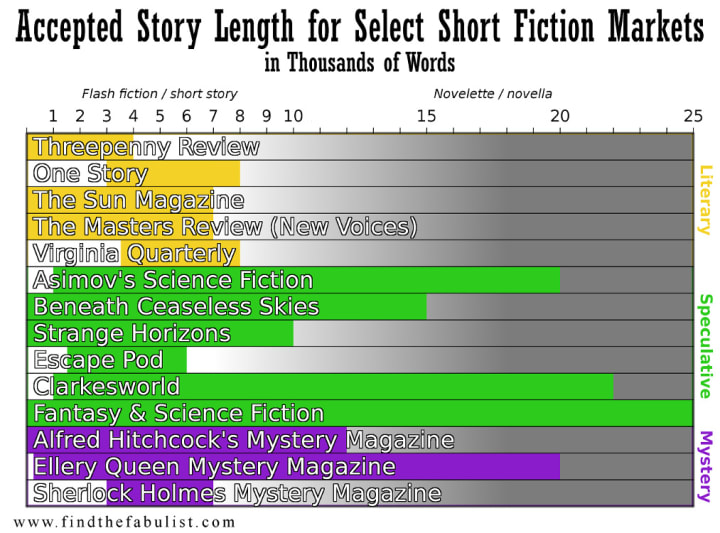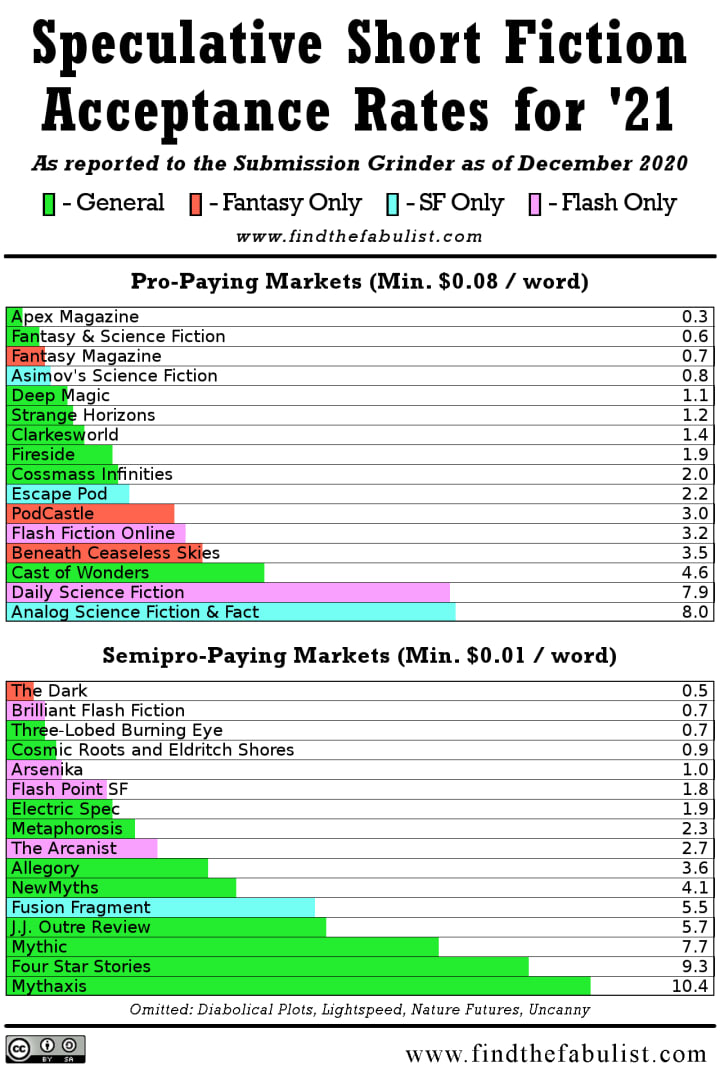The Big World of Short Stories: A Primer
The not-quite-ultimate guide to preparing and submitting short fiction

Aspiring fiction writers really fixate on the big prize. Everyone wants to publish a novel, claim a part of that fame, wealth and prestige that they perceive as a part of that. Such is their tunnel vision that they don't even consider that they might up their odds in the novel game if they have some smaller publishing credits.
It's not as though people don't think of short fiction at all. In my experience, every person shopping around a string of unreadable novels also has a fair number of unreadable short stories on their blog. Most of them seem to view short fiction as mere practice - and it is, but there's more to it than that.
I suspect that a lot of people never try to sell their short stories because they either don't know that it's a possibility or don't understand the procedure. So today, I'm going to go over the nuts and bolts of short fiction: Markets, submission, and the benefits to publication.
Why Short Fiction?
To repeat, short stories are good for a lot more than practice. The potential benefits are numerous:
- Let's start off with an obvious one: Short story markets pay. They don't all pay big, and none of them offer as much money as journalistic markets, but one can easily make hundreds of dollars from a standard-length short story. For those of you wondering how to make you writing pay, this is a way to get started.
- Short story markets are a great way to get much-needed exposure for other projects. Big markets can get lots of eyeballs on your work, and they can also direct those people toward novels, anthologies, or any other project you might have going on.
- Writing credits can go a long way toward building your personal brand. For speculative writers, short fiction has a long history as a gateway to bigger things, including membership in the Science Fiction and Fantasy Writers of America (SFWA). It can do the same thing for writers of literary fiction, offering an alternative to highly competitive personal essay markets. And anyone can benefit from having a few short fiction credits on a cover letter to an agent or publisher.
- You can even use short stories to further develop projects you've already finished, providing an alternative to lengthy, unnecessary worldbuilding. You can expand the universe of a finished novel while also promoting it, and maybe even get paid for it!
Okay, So What Do I Do Now?
There are a few things to know before you start submitting, starting with a little bit about rights. I'll come back to this later since most of it doesn't matter until you've made a sale, but make sure you do one thing:
Stop posting short stories on your blog.
Anything that appears on a public website is considered "published," meaning you can no longer sell it is an original work. You can only sell such pieces as reprints - most markets won't take those, and the ones that do pay a fraction of what they pay for unpublished works.
If you've read this far, I assume that you either have short stories ready to submit or are comfortable writing new ones. Writing stories is beyond the scope of this article. If you're really stuck, the below video has a few pointers:
That out of the way, there are two things you need to know: How to format your short stories and where to send them.
First, formatting. The good news is that most markets rely on a standard format - Shunn manuscript style. This is pretty standard stuff - 12-point font, double spaced, indented, contact information in the top left of the first page, and saved in .doc format. Some markets may ask for variations, most commonly anonymized submissions with the contact info omitted or a file format other than .doc - make sure to check their submission guidelines before sending anything.
You should also work up a short bio, which many markets will request. This will eventually contain some of your writing credits, but since you don't have any yet, just write a short, somewhat professional description of yourself. This is a good place to include any other projects you have - anything from self-published novels to a podcast.
Now that your pieces are ready to go, it's time to find some markets. There are a few sources:
- Writer's Market - This yearly guide contains an extensive list of high-profile markets, along with articles on publishing. Despite the link, I don't recommend buying it - your local library probably has a copy, though make sure it's current.
- The Submission Grinder - Maintained by the people behind the spec market Diabolical Plots, the Submission Grinder is searchable database containing a huge number of listings for fiction and poetry, though focusing mainly on speculative fiction. It's free to create an account, something I highly recommend.
- Duotrope = Another database, similar to but larger than the Submission Grinder. In addition to fiction and poetry, Duotrope contains nonfiction listings, along with a variety of submission tools. However, most of Duotrope is behind a paywall.
Start off with a Submission Grinder account. Add information on a few stories, do some searches and see what comes up. If you find something that seems like a good fit, you can easily navigate to their submission page and find out how to submit to them.
Before you get too eager, there are two more terms you'll see come up - multiple submission and simultaneous submission. While they may sound similar, these mean very different things.
- Multiple submission means sending several stories at once to the same market. This is commonly allowed (and even encouraged) for poetry markets but is rare in fiction.
- Simultaneous submission means sending the same story to several markets at once. This is pretty common in literary fiction markets (which tend to have very long response times), but uncommon in speculative markets.
Basically, unless the market specifically says otherwise, it's one story at at a time to one market at a time.
How Do I Break In?
That's the question, isn't it? I've been doing this for four years, I have dozens of credits, and I still haven't figured out how the mind of the acquisition editor works. However, there are a few things that might help:
Length. How long is a short story supposed to be? A market will give you a minimum and maximum, but you still have to read between the lines to figure out what they actually want. Most spec markets will technically take flash fiction, but it's a tough sell outside of flash-specific markets. Similarly, the very long submissions that are allowed by some markets are chiefly reserved for well-established authors.
Here's a quick look at what some significant markets say they want:

For a beginner, a target length of between 3000 and 5000 words is ideal. It allows for submission to the maximum number of markets, is favored for contests and anthologies, and - for spec writers - it will help you reach SFWA status the quickest.
Approval rates. One thing that the Submission Grinder lacks (at least as of this writing) is any means to sort by approval rate, which can very dramatically. This can range from under 1% for big, selective markets which receive lots of submissions to over 50% for tiny, marginal markets eager for content.
Here's a chart showing some recent acceptance numbers for significant spec markets:

Despite the long odds, I recommend going for the professional markets right away. You have the potential to gain a lot from publication in these places, far more than you would from an easy placement in a marginal market.
Oh No! I Got Rejected!
Of course you did. Now would be a very good time to get used to rejection, because you'll see it a lot. As of this writing, I have been rejected over 900 times. And forget all that folderol about "learning from failure" - you won't learn much of anything from a form letter, and the rare personal rejection might not tell you much more.
So what do you do? Well, you find another market and you send it out again. Then you write another piece. If you're serious about short fiction, you should start working on your next short as soon as you've finished and submitted one, anyway.
Hooray! I Got Accepted!
Aren't you special? You beat the odds and made the cut. Now, for most paying markets, you'll have a contract to look over. This won't come up for non-paying markets, and many others who pay a token rate (Usually $5-20 flat, or <$0.01 / word) might forego this as well. Everyone else will want your signature on something.
The most important thing that any market wants is first publishing rights, which is exactly what it sounds like - the right to publish this story first. These may be either print rights, audio rights or both, depending on the nature of the market - you can actually sell print and audio rights separately. Usually, this will come with a temporary exclusive period (6-12 months in most cases) during which you can't resell or republish it, and electronic archival rights to keep it on a website thereafter. Some markets forego exclusivity: It's never part of a contract for a reprint, and some anthologies will allow you to resell a story as a reprint as soon as the anthology is published.
What's most important is that all of these rights should eventually revert to you. If a market is demanding rights in perpetuity or asking for more than you see here, then it's probably not worth dealing with them. If you're using the Submission Grinder, you'll see a warning on the market page if the contract contains suspicious nonstandard terms.
Anything You're Leaving Out?
Oh yes, there's more - but these are the important bits. Short fiction publication is not easy, and there are a lot of subtleties that can take years to work out. If you're really dying for more information, there are a few more articles on my own site that may help you.
About the Creator
Andrew Johnston
Educator, writer and documentarian based out of central China. Catch the full story at www.findthefabulist.com.






Comments
There are no comments for this story
Be the first to respond and start the conversation.